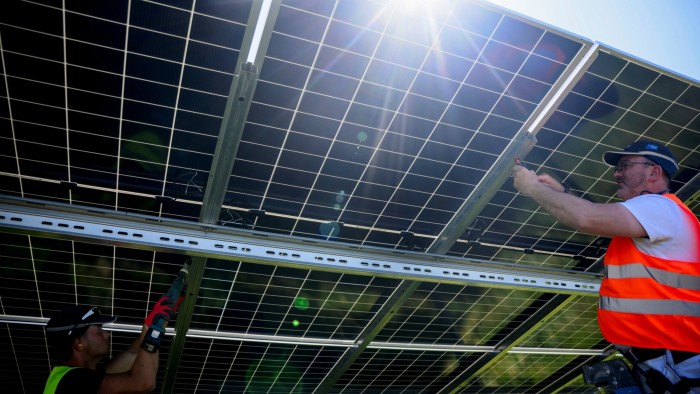Stay informed with free updates
Simply sign up to the Climate change myFT Digest — delivered directly to your inbox.
The EU is almost on track to meet its 2030 climate targets according to new data, a victory for Brussels even as it faces growing calls to weaken its environmental agenda.
The European Commission will announce next week that the EU is broadly within target to reduce its greenhouse gas emissions by 55 per cent by 2030 compared with 1990 levels, according to three EU officials with knowledge of the figures. The cuts were projected to be about 54 per cent, one official said.
The numbers were “surprisingly good”, said another senior official, adding that even though the bloc would not quite achieve a 55 per cent reduction, it was “as close to the mark as you could get”.
The numbers will be a boost for the commission and politicians still defending the bloc’s climate commitments after the European economy was left reeling from the impact of the Covid-19 pandemic, the energy crisis prompted by Russia’s full-scale invasion of Ukraine in 2022 and, more recently, Donald Trump’s trade war.
The commission has faced pressure to water down green legislation, including a plan to ban new combustion engines by 2035 in order to help Europe’s ailing car industry, which is lagging behind Chinese and US competitors.
The majority of the drop in EU emissions will come from the energy sector, according to a tracker published by climate think-tank Ember. Tomos Harrison, electricity transition analyst at Ember, said that member states were “heading in the right direction” and that wind and solar power build-out had played a major role.
The data will be published weeks before the commission lays out how the bloc can reach its 2040 climate target, which should amount to a 90 per cent emissions reduction. The EU has committed to reach net zero by 2050 — one of the most ambitious targets in the world.
The 2040 target will be closely watched internationally as countries submit emissions cutting commitments to the UN ahead of this year’s COP30 climate conference in Brazil.
Peter Liese, a German MEP from the conservative European People’s Party, the EU’s biggest political group, said that a 90 per cent target was “extremely ambitious and I don’t think we can support it [unless] major flexibilities are included”.
Countries such as Italy and Poland have pushed for a lower target, while France has also expressed scepticism. Germany’s new coalition government has said it could support a 90 per cent target if carbon credits could count towards the goal.
Heavy industries suffering from high energy prices have pointed out that a large chunk of emissions reductions have come from production cuts and plant closures, rather than decarbonisation.
One official with knowledge of the figures said that emissions from land use had shown one of the smallest reductions, citing logging and increasingly extreme weather — including the 2023 wildfires across southern Europe — which had impaired the land’s ability to absorb carbon.
Agriculture, which remains the only sector without its own emissions targets, was the “elephant in the room”, the official added. Farmers have violently protested against EU environmental measures.
The transport sector is another laggard, according to European Commission year-on-year climate data published last October.
The European Commission declined to comment on the figures.
The drop in the bloc’s emissions will do little to bring down global carbon emissions. The EU’s share was about 6 per cent in 2023, down from about 15 per cent in 1990. Global emissions have increased more than 60 per cent since 1990.
CAN Europe, an NGO that also tracks the climate goals, said that the achievement was “largely superficial”.
“In most countries, the underlying policies and measures are still insufficient to deliver the promised targets,” it said.
